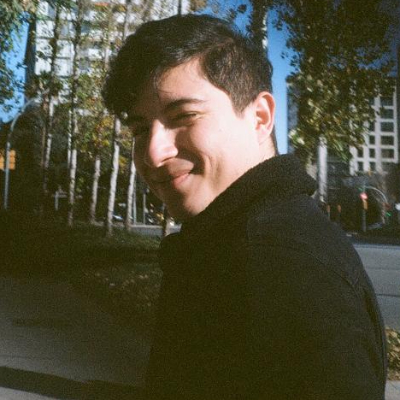Trilce in braille
“Who’s making all that racket?!” the nurse asks.
“It’s my veins, hiding,” I reply.
They sense the sting coming.
What if it’s true that from the nitrogen in DNA
to the carbon in apple pies
(even the calcium in your teeth),
all were forged inside
collapsing stars?
I think as the needle pierces my forearm.
I watch, certain now, that fear also flows in the blood
that emerges and spreads
into the plastic vial.
I’ve come for the routine checkup
(where they never see
our real wounds).
I suppress the blood with cotton
and stagger into the ophthalmologist’s office.
Like a bird with a wooden leg.
I can’t read the smallest letters.
Myopia expands,
like a jellyfish over the iris.
Nor do I see clearly the pulsing colors
in the spheres he shows me.
4, 2, 51, I make up these numbers,
that correspond to my mother’s birthdate.
The ophthalmologist doesn’t know she’s there,
but I can see her plainly
hanging sheets between two stars.
My heart now brims with the same rust
that stained the white laundry
as if hung out to dry
with the same rusted clothespins
of myself.
I rush out of the clinic
and, accidentally, collide with the cleaning woman
who—not for you, not for anyone—has a name.
Nor does what expands have a name for birds.
I sit to break my fast in a (now) Chinese bar.
I can’t stop thinking that 73% of the atoms
in the cleaning woman’s body
are just dust, stardust.
When I get home, I find I left the fridge wide open.
Melted ice has pooled into a tiny pond
where Orion drinks,
my neighbor’s cat
who looks more like you each day,
both resembling no one.
Then, trying to shoo him off,
I slip
and fall.
Are we nothing but fragments
of that instant
that lost its balance?
Finally, I understand why you or my mother
and even the iron in Orion’s blood
stem from the same collapsed star.
My father says chickens can recognize over a hundred different individuals
Like a porcupine trying, in vain,
to embrace another without harm,
so passed Miguel’s solitude among the trees.
(“Lucas,” his best friend, smoked coca paste joints
and looked like a beaten angel.)
I was nine years old, as old
as the Hillman’s unrepaired engine.
At that time, my father and I
buried a small chick
I’d accidentally stepped on in the kitchen.
I’d traded it for glass bottles.
A man hawked them
while pushing a tricycle piled with scrap
and spells.
They never scolded me for that small death.
Death, like every scar, is an accident,
like tripping over Adam’s tear, they told me.
Today my father is younger than I am.
Younger even than the son I’ll never have
yet he still remembers when we buried that little creature
now shrilling with pain in my throat.
Tonight, after climbing into bed,
I slipped into our backyard.
I knelt and began clawing at the dirt.
I feel the dead bird’s heart
still beating.
I dug and dug
until I found skeletons of other animals,
milk bottles,
unread letters from my mother.
Digging is filling a void with more void.
Then, beneath tears
dry as diamonds,
I finally see the dying chick.
He recognizes me.
Still there, cheeping with broken wings, but alive,
like Lucas’ solitude
smoking pacos among the trees.
Insomnia, a monkey’s business
I ask myself too many questions.
The problem of living split, anchored.
It can’t be serious shattering yourself
just to fall asleep.
Here’s a serious parable:
Hyperinflation or the dollar’s exchange rate
ruining my grandfather again.
I still hear him rise
with the temper of a rooster with strep throat.
I still hear him cough.
I go up to give him water—not to my grandfather
but to the turkey sleeping on the rooftop.
They’ve tied one leg to a stone,
though it wasn’t needed; he was my friend.
My grandfather and father brought him from the market.
The most beautiful, white turkey
Aviación Avenue had ever seen.
Thirteen kilos of feathers and dread.
He lived for a couple of weeks on the roof.
My father fattened him with worms and chicken skins,
though I remember he preferred pecking at stars
or mango pits.
One day my grandfather and father climbed up
with a large knife
and a bottle of pisco.
Three or four swigs later,
the turkey stopped squawking
and grabbed the knife himself—I swear.
When the moment came, I opened my eyes.
The turkey’s head rolled through the rain
like a mango pit.
His white flesh never glowed in my gut.
And yes, tonight, perched on the edge of the bed,
I’ve seen him again.
Once more the poor turkey
walking headless
between my father and me.
I ask myself too many questions.



